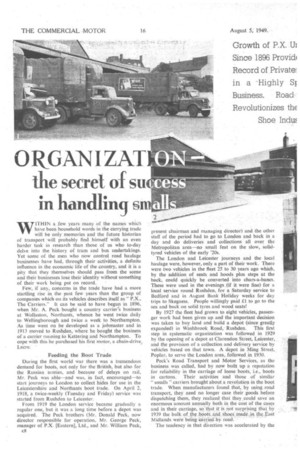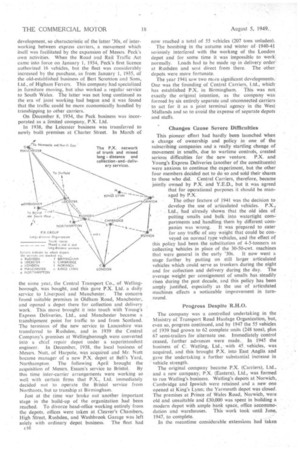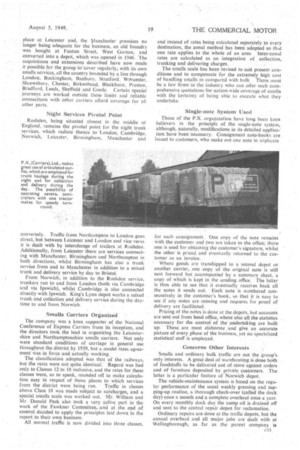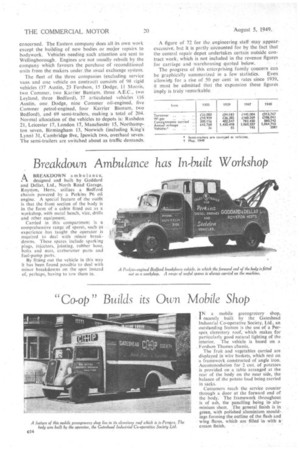ORGAN! ZAT the secret of su in handling sm
Page 44

Page 46

Page 49

Page 50

If you've noticed an error in this article please click here to report it so we can fix it.
WITHIN, a .few years many of the names which have been _household words in the carrying trade will be only memories and the future historian of transport -will probably find himself with an even harder task in research than those of us who to-day delve into the history of tram and bus undertakings. Yet some of the men who now control road haulage businesses have had, through their activities, a definite influence in the economic life of the country, and it is a pity that they themselves should pass from the scene and their businesses lose their identity without something
of their work being put on record, .
Few, if any, concerns in the trade have had a more startling rise in the past few years than the group of companies which omits vehicles describes itself as " The Carriers." It can be said to have begun in 1896, when Mr. A. Peck bought a country carrier's business at Wollaston, Northants, whence he went twice daily to Wellingborough and twice a week to Northampton. As time went on he developed as a jobrnaster and in 1913 moved to Rushden, where he bought the business of a carrier running to Kettering and Northampton. To cope with this he purchased his first motor, a chain-drive, Lacre.
Feeding the Boot Trade During the first world war there was a tremendous demand for boots, not only for the"British, but also for the Russian aimies, and because of delays on rail, Mr. Peck was able—and was, in fact, encouraged—to start journeys to London to collect hides for use in the Leicestershire and Northants boot trade. On April 2, 1918, a twice-weekly (Tuesday and Friday) service was started from Rushden to Leicester.
From 1919 the London service became gradually a regular one, but it was a long time before a depot was acquired. The Peck brothers (Mr. Donald Peck, now director responsible for operation, Mr. George Peck, manager of P.X. {Easternj, Ltd., and Mr. William Peek, c8 present chairman and managing director) and the other staff of the period had to go to London and back in a day and do deliveries and collections all over the Metropolitan area—no small feat on the slow,, solidtyred vehicles of the early '20s. The London and Leicester journeys and the local haulage were, however, only a part of their work. There were two vehicles in the fleet 25 to 30 years ago which, by the addition of seats and hoods plus steps at the back, could quickly be converted into chars-a-bancs. These were used in the evenings _(if it were fine) for a local service round Rushden, for a Saturday service to Bedford and in August Bank Holiday weeks for day trips to Skegness. People willingly paid £1 to go to the sea and back on solid tyres and wood seats!
By 1927 the fleet had grown to eight vehicles, passenger work had been given up and the important decision was taken to buy land and build a depot (since greatly expanded) in Washbroolc Road, Rushden. This first step in systematic organization was followed in 1929 by the opening of a depot at Clarendon Street, Leicester, and the provision of a collection and delivery service by vehicles based on that town. A depot in Ming Street, Poplar, to serve the London area, followed. in 1930.
Peck's Road Transport and Motor Services, as the business was called, had by now built UP a reputation for reliability in the carriage of loose boots,, i.e., boots in cartons. Their activities and those of similar "smalls " carriers brought about a revolution in the boot trade. When manufacturers found that, by using. road transport, they need no longer case their .goods before dispatching them, they realized that they _could save an enormous amount annually both in the cost of the cases and in their carriage, so that it is not surprising that by 1939 the bulk. of the boots and shoes" nude the .East Midlands werebeing Cara:fedby. road.
The tendency in that direction was accelerated by the
development, so characteristic of the latter '30s, of interworking between express carriers, a movement which itself was facilitated by the expansion of Messrs. Peck's own activities. When the Road and Rail Traffic Act came into force on January 1, 1934, Peck's first licence authorized 16 vehicles, but the fleet was considerably increased by the purchase, as from January I, 1935, of the old-established business of Bert Scroxton and Sons, Ltd., of Higham Feriers. This company had specialized in furniture moving, but also worked a regular service to South Wales. The latter was not long continued as the era of joint working had begun and it was found that the traffic could be more economically handled by transhipping to other carriers.
On December 8, 1934, the Peck business was incorporated as a limited company, P.X. Ltd.
In 1938, the Leicester business was transferred to newly built premises at Charter Street. In March of the same year, the Central Transport Co., of Wellingborough, was bought, and this gave P.X. Ltd. a daily service to Liverpool and Manchester. The concern found suitable premises in Oldham Road, Manchester, and opened a depot there for collection and delivery work. This move brought it into touch with Young's Express Deliveries, Ltd., and Manchester became a transhipment point for traffic to and from Scotland. The terminus of the new service to Lancashire was transferred to Rushden, and in 1939 the Central Company's premises at Wellingborough.were converted into a chief repair depot under a superintendent engineer. In December, 1938, the local business of • Messrs. Nutt. of Harpole, was acquired and Mr. Nutt became manager of a new P.X. depot at Bell's Yard, Northampton. The following April brought the acquisition of Messrs. Essam's service to Bristol. By this time inter-carrier arrangements were working so well with certain firms that P.X., Ltd. immediately decided not to operate the Bristol service from Northants. but to tranship at Birmingham.
Just at the time war broke out another important stage in the build-up of the organization had been reached. To divorce head-office working entirely from the depots, offices were taken at Cleaver's Chambers, High Street, Rushden, and Washbrook Garage was left solely with ordinary depot business. The fleet had cI0 now reached a total of 55 vehicles (207 tons unladen).
• The bombing in the autumn and winter of • 1940-41 seriously interfered with the working of the London depot and for some time it was impossible to work: normally. Loads had to be made up in delivery order' at Rushden and sent direct from there. The other depots were more fortunate.
The year 1941 saw two more significant developments. One was the founding of Central Carriers, Ltd., which has established P.X. in Birmingham. This was not exactly the original intention, as the company was formed by six entirely separate and unconnected carriers to act for it as a joint terminal agency in the West Midlands and so to avoid the expense of separate depots and staffs.
Changes Cause Severe Difficulties
This pioneer effort had hardly been launched when a change of ownership and policy in one of the subscribing companies and a really startling change of movement in smalls, due to wartime controls, created
serious difficulties for the new venture. P.X. and Young's Express Deliveries (another of the constituents) were anxious to continue the experiment, but the other four members decided not to do so and sold their shares to those who did. Central Carriers, therefore, became jointly owned by P.X. and Y.E.D., but it was agreed that for operational purposes it should be managed by P.X.
The other feature of 1941 was the decision to develop the use of articulated vehicles. P.X., Ltd., had already shown that the old idea of putting smalls and bulk into watertight compartments and handling them by different com
panies was wrong. It was prepared to cater for any traffic of any weight that could be conveyed on normal type vehicles, and the effect of this policy had been the substitution of 4-5-tonners as Collecting tehicles in place of the 30-50-cwt. machines that were general in the early '30s. It now went a stage further by putting on still larger articulated vehicles which could serve as trunkers during the night and for collection and delivery during the day. The average weight per consignment of smalls has steadily risen during the past decade, and this policy has been amply justified, especially as the use of articulated machines effects a noticeable improvement in turnround.
Progress Despite. R.H.O.
The company was a controlled undertaking in the Ministry of Transport Road Haulage Organization, but, even so, progress continued, and by 1947 the 55 vehicles of 1939 had grown to 62 complete units (248 tons), plus 67 semi-trailers for alternate use. Immediately control ceased, further advances were made. In 1945 the business of C. Watling, Ltd., with 45 vehicles, was acquired, and this brought P.X. into East Anglia and gave the undertaking a further substantial increase in vehicle strength.
The original company became P.X. (Carriers), Ltd., and a new company; P.X. (Eastern), Ltd., was formed to run Watling's business. Watling's depots at Norwich, Cambridge and Ipswich were retained and a new one opened at King's Lynn; the Yarmouth depot was closed. The premises at Prince of Wales Road, Norwich, were old and unsuitable and £30,000 was spent in building a modern depot with ample bank space, office accommodation and warehouses. This work took until June, 1947, to complete. .
In the meantime considerable extensions had taken place at Leicester and, the .1-lanchester premises no longer being adequate for the business, an old foundry was bought at Fenton Street, West Gorton, and converted into a depot, which was opened in 1946. The acquisitions and extensions described have now made it possible for the group to'cover regularly, with its own smalls services, all the country bounded by a line through London, Buckingham, Banbury, Stratford, Werrcester, Shrewsbury, Chester, Birkenhead, Blackburn. Preston, Bradford, Leeds, Sheffield and Gook. Certain special journeys are worked outside these limits and reliable connections with other carriers afford coverage for all other parts.
Night Services Pivotal Point
Rushden, being situated almost in the middle of England, remains the pivotal point for the night trunk services, which radiate thence to London, Cambridge, Norwich, Leicester, Birmingham, Manchester and conversely. Traffic from Northampton to London goes direct, but between Leicester and London and vice versa it is dealt with by interchange of trailers at Rushden. Additionally, from Leicester there are services connecting with Manchester, Birmingham. and Northampton in both directions, whilst Birmingham has also a trunk service from and to Manchester in addition to a mixed trunk and delivery service by day to Bristol.
From Norwich, in addition to the Rushden service, trunkers run to and from London (both via Cambridge and via Ipswich), whilst Cambridge is also connected directly with Ipswich. King's Lynn depot works a mixed trunk and collection and delivery service during the daytime to and from Norwich.
Smalls Carriers Organized •
The company was a keen supporter of the National Conference of Express Carriers from its inception, and the directors took the lead in organizing the Leicestershire and Northamptonshire smalls carriers. Not only were standard conditions of carriage in general use throughout the district by 1939, but a model fates agreement was in force and actually working.
The classification adopted was that of the railways, but the rates were not quite identical. Regard was had only to Classes 12 to 18 inclusive, and the rates for these classes were, so to speak, rounded off to make calculation easy in respect of those places to which services from the district were being run. Traffic in classes above Class 18 was made subject to surcharges, and a special smalls scale was worked out. Mr. William and Mr. Donald Peck also took a very, active part in the work of the Fawkner Committee,. and at the end of control decided to apply the principles laid down in the report to their own business.
All normal traffic is now divided into three classes, and instead of rates being calculated separately to every destination, the zonal method has been adopted so that one rate applies to the whole of an area. Inter-zonal rates are calculated as an integration of collection, trunking and delivering charges. • The smalls scale has been revised to suit present conditions and to compensate for the extremely high cost of handling smalls as compared with bulk. There must be a few firms in the industry who can offer such comprehensive quotations for nation-wide coverage of smalls with the bertainty of being able to execute what they undertake.
Single-note System Used
Those of the P.X. organization have long been keen believers in the principle of the single-note system, although, naturally, modifications in its detailed application have been -necessary. Consignment note-books are Issued to customers, who make out one note in triplicate
for each consignment. One copy of the note remains with the customer and two are taken to the office; there one is used for obtaining the customer's signature, whilst the other is priced and eventually returned to the customer as an invoice.
Where goods are transhipped to a second depot or another carrier, one copy of the original note is still sent forward but accompanied by a summary sheet, a copy of which is kept in the sending office. The latter is thus able to see that it eventually receives back all the notes it sends out. Each note is numbered consecutively in the customer's book, so that it is easy to see if any notes are •missing and requests for proof of delivery are' facilitated.
Pricing of the notes is done at the depots, but accounts are sent out from head office, where also all the statistics necessary for the control of the undertaking are built up. These are most elaborate and give, an accurate picture of every phase of the business, yet no specialized statistical staff is employed.
• Concerns Other Interests Smalls and ordinary bulk traffic are not the group's only interests. A great deal of warehousing is done both of foodstuffs to be delivered out of store against orders and of furniture deposited by private customers. The latter is a particular feature of Norwich depot.
The vehicle-maintenance system is based on the regular performance of the usual weekly greasing and topping-up routine, a thorough check-over (called the dock day) once a month and a complete overhaul once a year. On every monthly dock day the sump oil is drained off and sent to the central repair depot for reclamation.
Ordinary repairs are done at the traffic depots, but the annual overhaul and all major jobs are dealt with at Wellingborough, as far as the parent company is concerned. The Eastern company does all its own woit except the building of new bodies or major repairs to bodywork. Vehicles needing such attention are sent. to Wellingborough. Engines are not usually rebuilt by the company which favours the purchase of reconditioned units from the makers under, the usual exchange system.
The fleet of the three companies (excluding service vans and one vehicle on contract) consists of 98 rigid vehicles (37 Austin, 23 Fordson, 15 Dodge, 11 Morris, two Commer, two Karrier Bantam. three A.E.C., two Leyland, three Bedford), 37 articulated vehicles .(16 Austin, one Dodge, nine Commer oil-engined, five Commer petrol-engined, four Karrier Bantam, two Bedford), and 69 semi-trailers, making a total of 204. Normal allocation of the vehicles to depots is: Rushden 21, Leicester 17, London 17, Manchester 15, Northampton seven, Birmingham 13, Norwich (including King's Lynn) 31, Cambridge five, Ipswich two, overhaul seven. The semi-trailers are switched about as traffic demands. A figure of 72 for the engineering staff, may appearexcessive, but it is partly accounted for by the fact that the central repair depot undertakes certain outside contract work, which is not included in the revenue figures for carriage and warehousing quoted below.
The progress of this enterprising family concern can be graphically summarized in a few statistics. Even allowirrg for a rise of 50 per cent in rates since 1939, it must be admitted that the 'expansion these figures imply is truly' remarkable. .
























































































